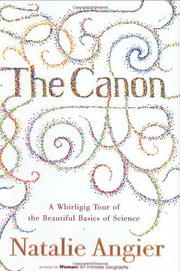


THE CANON
A Whirligig Tour of the Beautiful Basics of Science
by Natalie Angier
Decrying smug scientific illiteracy, New York Times science writer Angier (Woman, 1999, etc.) deftly sets forth the universally accepted principles underlying basic science that everyone should understand.
This bestselling author’s love of words is writ large here. Hardly a page goes by without an internal rhyme (“sirs and madams we’re all made of atoms”), or an unexpected adjective (a gecko with a nose of “Necco pink”), or a blunt descriptor (the living cell is squishy like snot) that sets up a what-will-she-say-next? tease. A snappy style is simply her way of making sure we pay attention as Angier presents chapters on thinking scientifically, probability, scales of measurement, physics, chemistry, evolution, molecular biology, geology and astronomy, all of them liberally laced with juicy quotes from the powerhouses she’s interviewed. The chapter on evolution alone is worth it, providing ample evidence to confront creationists and their intelligent-design offspring. Against the intelligent-designers’ argument of “irreducible complexity”—the idea that, for example, the intricate blood-clotting mechanism found in vertebrates is just too complex to have evolved through “clunky” natural selection—she places biologist Kenneth Miller’s analysis of the far cruder and simpler clotting process in invertebrates: “exactly the kind of ‘imperfect and simple’ system that Darwin regarded as a starting point for evolution.” Dentists will love the chapter on molecular biology, which begins with a description of the scrupulous dental hygiene Angier practices as part of her never-ending battle against the oral bacteria assaulting tooth enamel. Such graphic, homely examples serve as springboards for the deeper stuff, whether it’s the genetic code or the ever-expanding universe. She even makes it clear why it’s hard to get your arms around the idea that galaxies are not exploding outward into space, but that space itself is stretched.
Not everything is as easy as pie (or pi) to grasp, and therein lies the excitement and challenge of science, masterfully conveyed here.